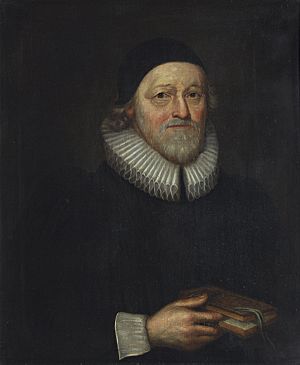Samuel Ward (scholar) facts for kids
Samuel Ward (1572–1643) was an important English scholar and a leader at the University of Cambridge. He was also one of the people chosen to represent the Church of England at a big meeting called the Synod of Dort. This meeting helped shape religious ideas at the time.
Contents
Samuel Ward's Life Story
Samuel Ward was born in a place called Bishop Middleham in County Durham. He was a very bright student. He went to Christ's College, Cambridge and earned his first degree in 1592. Later, he became a special member, called a Fellow, at Emmanuel College and then at the new Sidney Sussex College.
Helping with the King James Bible
Samuel Ward was one of the scholars who helped translate the famous King James Bible. This was a huge project that created a very important English Bible. He worked on a part of the Bible known as the Apocrypha. During this time, he met James Ussher, another scholar, and helped him with his research.
Becoming a College Master
In 1610, Samuel Ward was chosen to be the Master of Sidney Sussex College. This meant he was in charge of the college. He also earned his highest degree, a D.D. (Doctor of Divinity). People knew him as a thoughtful person with Calvinist views, who was also very loyal to the Church of England.
In 1619, he was one of the English representatives sent to the synod of Dort. This was a very important international meeting where religious leaders discussed Christian beliefs. People at the meeting thought he was one of the most learned members there.
Later Years and Challenges
In 1623, Samuel Ward became a professor of divinity at the university. He continued to be involved in important religious discussions.
When the First English Civil War began, Samuel Ward faced a difficult choice. He felt it was his duty to support the King. Because of this, he disagreed with the group called the Presbyterians, who were against the King. In 1643, he was put in prison at St. John's College. His health got worse, and he was allowed to go back to his own college.
Samuel Ward passed away on September 7, 1643. He was buried in the college chapel. Many people, including his students and friends, remembered him as a great scholar and a good person.
Discovering a King James Bible Manuscript
In 2015, something very exciting was found! A professor named Jeffrey Alan Miller discovered an early draft of a part of the King James Bible among Samuel Ward's old papers. This draft was written in Ward's own handwriting between 1604 and 1608.
What the Manuscript Shows
The manuscript shows how Samuel Ward worked on translating parts of the Bible's Apocrypha. It has notes in Latin, Greek, and Hebrew. This discovery is very important because it helps us understand how the King James Bible was translated. It suggests that some parts were translated by individual scholars working alone, not always by a group working together.
Before this, a scholar named Henry Todd (priest) had mentioned Ward's draft of one of these books in the early 1800s. However, he didn't know exactly where it was or that it also contained other parts of the Bible.
You can see a full digital copy of this special manuscript online here.
Samuel Ward's Writings
Samuel Ward wrote several books and papers during his life. These are some of his published works:
- Gratia discriminans: Concio ad Clerum habita Cantabrigiae, 12 January 1625, published in London in 1626.
- Magnetis reductorium Theologicum Tropologicum, published in London in 1637.
- De Baptismatis Infantilis vi et efficacia Disceptatio, published in London in 1653.
- Opera nonnulla: Declamationes Theologicae, Tractatus de justificatione, Praelectiones de peccato originali, published in London in 1658.
- His diary, called The Diary Of Samuel Ward: A Translator Of The 1611 King James Bible, which covers parts of his life from 1595 to 1632.
 | May Edward Chinn |
 | Rebecca Cole |
 | Alexa Canady |
 | Dorothy Lavinia Brown |


